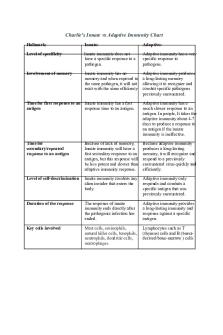Immunity - Transactional vs. Derivative Use PDF

| Title | Immunity - Transactional vs. Derivative Use |
|---|---|
| Course | Criminal Prcoedure |
| Institution | Touro College |
| Pages | 3 |
| File Size | 97.3 KB |
| File Type | |
| Total Downloads | 113 |
| Total Views | 142 |
Summary
Criminal Procedure 2020 Lecture Notes on Immunity; Differences between transactional and derivative use...
Description
Criminal Procedure Spring 2020
TOPIC: Immunity - Transactional vs. Derivative Use
Immunity • A way we can get witnesses to testify before GJ or in trial is to provide them with immunity. • Immunity eliminates self-incrimination problems, so witness can no longer validly assert that right. • US v. Kastigar: if a person has a valid right against self-incrimination, but you still want them to testify, then their ability to self-incriminate has to be removed. Sources of Immunity • There are two sources of immunity: formal and informal • Formal immunity: o Immunity granted under 18 U.S.C. § 6002 to a witness compelled to provide self-incriminating information to a grand jury, federal agency, or federal legislative body that prohibits prosecuting authorities from using the information provided against the witness in criminal proceedings. o Judge signs immunity and now the reluctant witness has to testify or they go to jail • Informal immunity: o Conferred amongst the parties and these function like a contract Transactional Immunity (cannot be prosecuted after testimony) • Witness is granted immunity for any crime for which the compelled testimony relates. • Completely protects witness from future prosecutions for crimes related to his or her testimony. • No non-responsive grant of immunity (can’t throw in random crimes) o If the individual admits to another crime, then the answers have to have been legitimately responsive to the questions they were asked
o Can’t just say “oh btw I killed 5 people” and get a grant of immunity for it Use and Derivative Use Immunity (can be prosecuted after testimony) • Rule: Does not prohibit later prosecution for the crimes that are the subject of the testimony, but the compelled testimony nor any evidence derived from the compelled testimony can be used against the defendant when they are later prosecuted o Evidence instead has to come from an independent source if person is later prosecuted. In other words, if the prosecutor acquires evidence substantiating the crime independently of the witness's testimony, the witness may then be prosecuted. • *Does not protect you from prosecution, but there must be independent evidence to prosecute you that has nothing to do with your GJ testimony. • *see example in notes pg 87-88.
Use vs. Derivative Use • Splicing – can only happen in informal because parties can negotiate terms • Use - evidence directly coming from witness’s testimony (i.e. literal testimony) o Ex) I sold mattresses without the tags – protected from being prosecute for this. • Derivative – other evidence that can be discovered from witness testimony o Any additional evidence prosecutors would find as result of the testimony o Ex) I sold mattresses on Spruce street – can’t go to Spruce street and find evidence to later prosecute me. • Note: My immunity is mine and mine only. If in the above example, the police go to spruce street and find Cody illegally selling mattresses, he can still be prosecuted. New Jersey v. Portash (cannot impeach D with immunized testimony)
• Facts: Defendant was granted use and derivative use immunity. Defendant testifies at GJ that he was in LA on July 31. At trial he now says he was NOT in LA on July 31. • Rule: immunized testimony cannot be used to impeach witness at trial o because if the defendant had pled the 5th then there would have been no testimony at all. Murphy v. Waterfront Community • Facts: Was given state law immunity, but conduct was also a violation of federal law • Rule: Grant of immunity before one sovereign (fed gov) has to be honored by another sovereign (state gov)....
Similar Free PDFs

Immunity
- 17 Pages

Derivative
- 9 Pages

Derivative assignment
- 3 Pages

Immunity Worksheet
- 5 Pages

Derivative review
- 3 Pages

Derivative Claims
- 6 Pages

Derivative Quiz
- 1 Pages

Math - derivative
- 26 Pages

Statutory Derivative Action
- 1 Pages

Derivative Practice 1
- 1 Pages

Basic Derivative Formulas
- 1 Pages
Popular Institutions
- Tinajero National High School - Annex
- Politeknik Caltex Riau
- Yokohama City University
- SGT University
- University of Al-Qadisiyah
- Divine Word College of Vigan
- Techniek College Rotterdam
- Universidade de Santiago
- Universiti Teknologi MARA Cawangan Johor Kampus Pasir Gudang
- Poltekkes Kemenkes Yogyakarta
- Baguio City National High School
- Colegio san marcos
- preparatoria uno
- Centro de Bachillerato Tecnológico Industrial y de Servicios No. 107
- Dalian Maritime University
- Quang Trung Secondary School
- Colegio Tecnológico en Informática
- Corporación Regional de Educación Superior
- Grupo CEDVA
- Dar Al Uloom University
- Centro de Estudios Preuniversitarios de la Universidad Nacional de Ingeniería
- 上智大学
- Aakash International School, Nuna Majara
- San Felipe Neri Catholic School
- Kang Chiao International School - New Taipei City
- Misamis Occidental National High School
- Institución Educativa Escuela Normal Juan Ladrilleros
- Kolehiyo ng Pantukan
- Batanes State College
- Instituto Continental
- Sekolah Menengah Kejuruan Kesehatan Kaltara (Tarakan)
- Colegio de La Inmaculada Concepcion - Cebu




